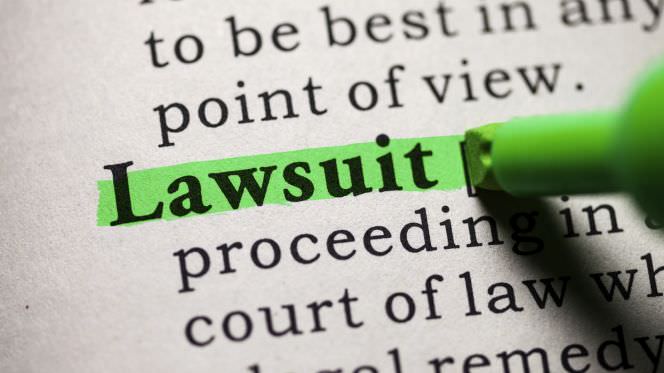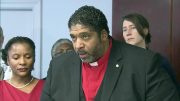The lure of the NFL was just too much for Inglewood, a former city employee charges in a federal lawsuit.
Barbara Ohno, Inglewood’s former budget and accounting manager, claims that the future home of the Los Angeles Rams massaged its accounting books to mask its financial problems.
In the complaint, Ohno says that Mayor James T. Butts ordered employees to “create a facade of financial responsibility and well-being for the city” as it competed against Carson to house one of three football teams looking to relocate to the Los Angeles area.
NFL team owners ultimately voted in January to return the Rams to Southern California, to play in a new stadium on the site of the old Hollywood Park racetrack in Inglewood. The stadium, projected to open in 2019, will be the league’s largest in square footage.
But, according to Ohno, to improve the city’s chances of winning the NFL team derby, officials padded the general fund, according to a 48-page complaint filed last week with the U.S. District Court.
The city allegedly used restricted federal and state grant money to pay for daily operational costs and used money seized from federal crime enforcement operations that was meant to cover police-related expenses.
“On a regular basis, the City, at the direction of Defendant Mayor Butts, violated the rules of the program by tapping into the Asset Forfeiture Fund to pay for unauthorized expenses, again because there was insufficient money in the General Fund to cover such expenses,” the lawsuit states.
Butts said that the claims were “totally baseless and without any merit.”
“The city undergoes rigorous and thorough audits by an outside audit firm,” he said in a statement. “We are proud of the improvements made during my tenure in not only improving its reserves, but our financial reporting procedures.”
Ohno was a probationary employee who was released prior to the completion of her probationary period, he said.
“The attempt to connect her separation with the efforts to secure an NFL franchise are clearly contrived and false,” he added. “During the 2 1/2-year relocation process, the city was never required to present financial data to the NFL.”
If the city were asked to turn over financial records, Butts said, they would reveal that the city has almost quadrupled its reserves, eliminated $164 million in unfunded liabilities and vastly improved public services.
Butts offered up a Moody’s Investor Service report from January that gave Inglewood an A1 credit rating, an upper-medium grade with low credit risk.
“The financial position of the city is robust and is a notable strength when compared to its A1 ratings,” the report said.
Ohno alleges that Inglewood’s accounting books showed Inglewood received money owed to the city when there were no receipts or agreements that corroborated actual payment.
Additionally, the city “regularly and knowingly fostered, ordered and engaged in faulty financial and accounting practices, fraudulent regulatory reporting and reclassification of costs to depict a favorable, but false, financial picture of the city’s general fund and overall fiscal responsibility,” Ohno alleges in the lawsuit.
Ohno said she brought the matter to the attention of her supervisors, David Esparza, who oversees the city’s finance department, and Sharon Koike, the assistant finance director. She said they refused to take action. Ultimately, Ohno said, she was threatened with termination unless she fell in line with the city’s plan.
The city was already in the process of transforming the old Hollywood Park racetrack into a residential and commercial district, and Rams owner Stan Kroenke was flirting with the idea of moving the team from St. Louis to Los Angeles. Early last year, Butts announced that Kroenke would build an 80,000-seat NFL-caliber stadium next to the former racetrack. The construction of the stadium was expected to create 22,000 jobs, with almost a third projected to be local hires, according to the lawsuit.
A month later, Carson announced that it was planning to build an NFL stadium to be used jointly by the San Diego Chargers and the Oakland Raiders. Over the next year, each city angled to position itself as the best suited for one or more NFL teams. Each voted to fast-track the approval of a stadium, bypassing lengthy environmental reports, and tried to cast doubt on the other’s proposals.
Carson commissioned a study in which a former head of the U.S. Homeland Security Department expressed “safety and security concerns” with Inglewood’s stadium site being in the direct flight path of L.A. International Airport.
Butts said that landing an NFL team would be a big boon for the city’s image and bank accounts. Sunday football games and off-season events would bring in millions in tax revenue. The construction of the stadium was already projected to bring in $15 million in sales tax revenue in 2016-17 and $25 million each year after, the lawsuit said.
Once completed, a new entertainment center surrounding the stadium has been projected to create 12,000 full- and part-time jobs.
Ohno alleges in her lawsuit that the city was counting on winning the NFL team derby.
“Defendant Mayor Butts and the City were overconfident that as soon as an NFL team was awarded to the City, millions upon millions of dollars would befall the City which would enable the City to conceal the financial and accounting improprieties before the NFL, the public, or the federal government, would notice,” the lawsuit alleges.
Source: www.latimes.com




